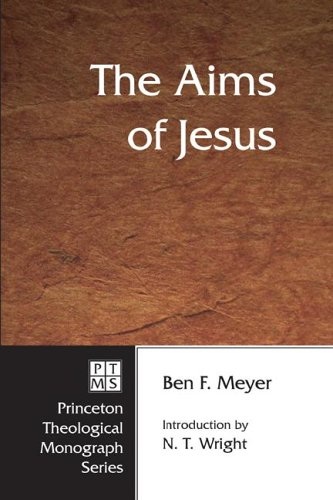










It's great to see this book back in print. I read it about 15 years ago, and it, along with N. T. Wright's New Testament and the People of God, Jesus and the Victory of God, and What St. Paul Really Said completely rearranged my thinking about Christianity, eventually leading me from evangelical Protestantism to Roman Catholicism.
The Aims of Jesus literally revolutionized Jesus studies. If nothing else, it contributed two lasting achievements: it made critical realism the hermeneutic norm, and it launched the Third Quest for the historical Jesus, followed by Wright, Witherington, Meier, and others.
The idea behind the book is really rather simple: Let's treat Jesus like any other historical figure, such as Alexander the Great. That is, let's see if we can determine what Jesus' project was, what he hoped to accomplish, what his aims in life were. Can we find out what he thought his purpose on earth was, and can we also make a determination about how successful he was?
In order to be able to do this, it's necessary to get proper "hermeneutic access" to the materials that give an account of his life, primarily the New Testament gospels and letters. That's where "critical realism" comes in--which is simply a method for analyzing texts. It involves situating texts in their proper community context, looking at their historical value in relation to the events they recount, placing the figures they portray (primarily Jesus and the Disciples) in their early first century Jewish setting, and assessing the movement that arose as a consequence of their lives and acts. It is not generally concerned with determining the authenticity of particular sayings; rather it is more concerned with the picture that emerges from a "hermeneutics of generosity" as opposed to a "hermeneutics of suspicion" which has dominated Jesus studies for the past three and a half centuries.
What you get with this approach is a way to link the most important aspects of Jesus' life and mission together: his Jewish background, his preaching ministry, his death and resurrection, the documents that recount these events, and the movement that arose following his departure from this earth.
If the conclusions are not startlingly original, the book nevertheless provides readers with new access to who Jesus was (and is, for Christians), and, especially, to the events of his life in relation to the rise of the Early Church.
Ben F. Meyer was certainly one of the greatest Jesus scholars of the last century. It would also be wonderful to have his other classic text, The Early Christians: Their World Mission and Self-Discovery, back in print.

